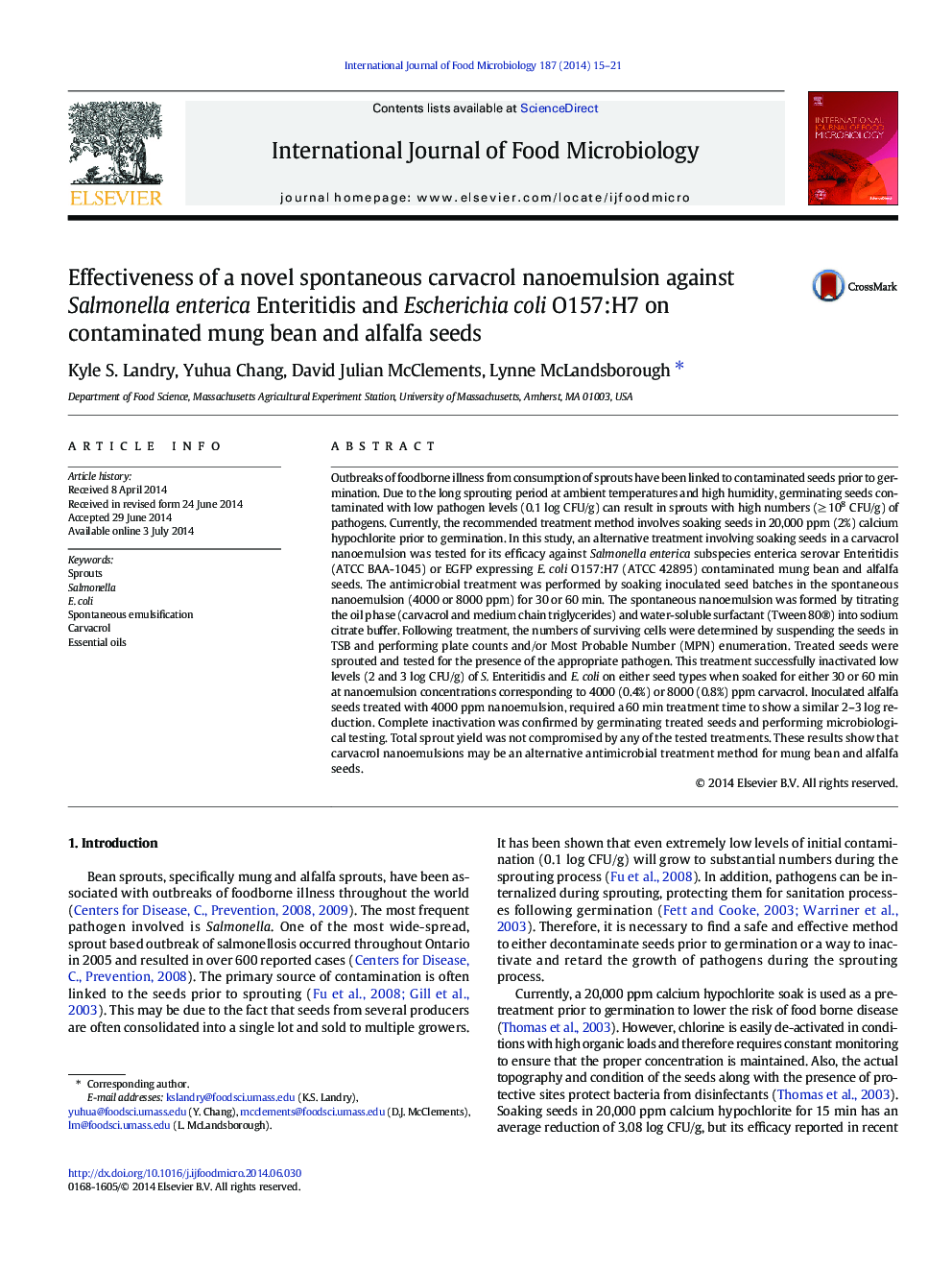| کد مقاله | کد نشریه | سال انتشار | مقاله انگلیسی | نسخه تمام متن |
|---|---|---|---|---|
| 4366898 | 1616596 | 2014 | 7 صفحه PDF | دانلود رایگان |
عنوان انگلیسی مقاله ISI
Effectiveness of a novel spontaneous carvacrol nanoemulsion against Salmonella enterica Enteritidis and Escherichia coli O157:H7 on contaminated mung bean and alfalfa seeds
دانلود مقاله + سفارش ترجمه
دانلود مقاله ISI انگلیسی
رایگان برای ایرانیان
کلمات کلیدی
موضوعات مرتبط
علوم زیستی و بیوفناوری
علوم کشاورزی و بیولوژیک
دانش تغذیه
پیش نمایش صفحه اول مقاله

چکیده انگلیسی
Outbreaks of foodborne illness from consumption of sprouts have been linked to contaminated seeds prior to germination. Due to the long sprouting period at ambient temperatures and high humidity, germinating seeds contaminated with low pathogen levels (0.1 log CFU/g) can result in sprouts with high numbers (â¥Â 108 CFU/g) of pathogens. Currently, the recommended treatment method involves soaking seeds in 20,000 ppm (2%) calcium hypochlorite prior to germination. In this study, an alternative treatment involving soaking seeds in a carvacrol nanoemulsion was tested for its efficacy against Salmonella enterica subspecies enterica serovar Enteritidis (ATCC BAA-1045) or EGFP expressing E. coli O157:H7 (ATCC 42895) contaminated mung bean and alfalfa seeds. The antimicrobial treatment was performed by soaking inoculated seed batches in the spontaneous nanoemulsion (4000 or 8000 ppm) for 30 or 60 min. The spontaneous nanoemulsion was formed by titrating the oil phase (carvacrol and medium chain triglycerides) and water-soluble surfactant (Tween 80®) into sodium citrate buffer. Following treatment, the numbers of surviving cells were determined by suspending the seeds in TSB and performing plate counts and/or Most Probable Number (MPN) enumeration. Treated seeds were sprouted and tested for the presence of the appropriate pathogen. This treatment successfully inactivated low levels (2 and 3 log CFU/g) of S. Enteritidis and E. coli on either seed types when soaked for either 30 or 60 min at nanoemulsion concentrations corresponding to 4000 (0.4%) or 8000 (0.8%) ppm carvacrol. Inoculated alfalfa seeds treated with 4000 ppm nanoemulsion, required a 60 min treatment time to show a similar 2-3 log reduction. Complete inactivation was confirmed by germinating treated seeds and performing microbiological testing. Total sprout yield was not compromised by any of the tested treatments. These results show that carvacrol nanoemulsions may be an alternative antimicrobial treatment method for mung bean and alfalfa seeds.
ناشر
Database: Elsevier - ScienceDirect (ساینس دایرکت)
Journal: International Journal of Food Microbiology - Volume 187, 18 September 2014, Pages 15-21
Journal: International Journal of Food Microbiology - Volume 187, 18 September 2014, Pages 15-21
نویسندگان
Kyle S. Landry, Yuhua Chang, David Julian McClements, Lynne McLandsborough,